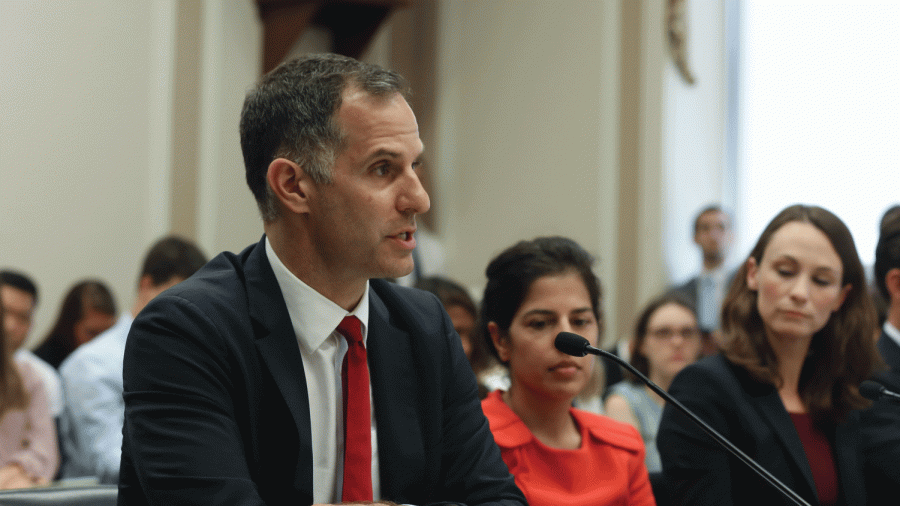Sanderson Lectures on Global Threats and Terrorism in the Modern World
Thomas M. Sanderson, pictured above, spoke on the current global threats landscape and terrorism. Sanderson explained that poverty and marginalization create violence and instability, preventing the eradication of terrorism.
Thomas M. Sanderson gave a talk on the global threats landscape and terrorism in Persson Auditorium on Wednesday, November 8. Sanderson currently works as the Director for the Transnational Threats Project at the Center for Strategic and International Studies, where he investigates terrorism and insurgency as well as global trends and criminal networks. He then relays this information through articles for various media outlets as well as through communication with intelligence officials, business leaders and academics.
Sanderson describes our modern day as being a period of “systemic disorder” and the most insecure time in terms of global stability. He paints a picture of a world with hundreds of millions of marginalized people that live with unmet expectations and dissatisfaction; around 60 million of these people are either refugees or displaced persons. It is this population of marginalized people that Sanderson describes as being the prime recruitment base for terror groups such as al-Qaeda and ISIS.
This captive recruitment base is coupled with the prevalence of technology and social media within these marginalized communities – in contrast with common Western notions that there is a lack of technology in impoverished and politically unstable areas. Through a heavy barrage of propaganda media – around 90,000 social media messages a day – ISIS and other terror groups are able to use this extremely prevalent technology to recruit from this base of marginalized and dissatisfied people.
A key point that Sanderson articulated was that terrorism as we know it today cannot truly be extinguished, but rather it will continue to exist as long as there are places with large populations of impoverished people whose needs are not being met by their governments. These people who in times of need – for example a natural disaster – are not provided for by their governments, then turn to extremist religious or political
ideologies that provide answers and refuge.
First-year Christina Weiler emphasized the importance of a representative government.
“Terrorism is the most lethal threat to undeserved communities in politically unstable countries across the globe. Facing stresses and anxieties unimaginable to most, these communities most desperately need a more reliable government,” Weiler said.
Sanderson defines terrorism as the use of violence against non-state actors or non-combatants to promote some sort of government action. Sanderson pointed out that almost no religion has escaped the desire and/or need to use terrorism in some form. He pointed to examples from the Christian and Jewish faiths and the use of violence throughout history to promote ideologies.
Modern terror groups such as ISIS and al-Qaeda are able to provide the promise and hope of fulfillment to some marginalized people of the modern world. These organizations are able to fill deficits and gaps in personal lives, while providing dignity, respect and a sense of purpose within these communities and organizations. Extreme poverty can consistently breed resentment and a search for fulfillment. ISIS can promise to provide a means to fill these voids and offer the possibility of being a hero.
Rather than terrorism ever truly ending, Sanderson said that people should expect it to evolve. With issues such as corruption, poor governance and poverty still in existence, terror groups will continue to exist. Sanderson describes a process by which extreme ideologies and terror groups fill the void of good government and lead to ever-present violence due to poverty and corruption. From Sanderson’s perspective, terrorism, rather than being a product of an innate wrongness in a cultural belief system, is in actuality a problem symptomatic of larger issues that exist in many regions around the world.
First-year Matthew Carusi responded to this lecture.
“I thought the talk was very humbling but at the same time extremely informative. It was depressing at times to hear about all the threats facing this country. However, I really liked how he said that when people are put in stressful situations, they are more motivated to find solutions to their problems,” Carusi said.
However, as Sanderson has presented this complex issue of terrorism in the modern age, the solution will be one that requires a nuanced approach to the complexities of the modern geopolitical landscape.
Contact Shelby Stevens at sstevens@colgate.edu.





